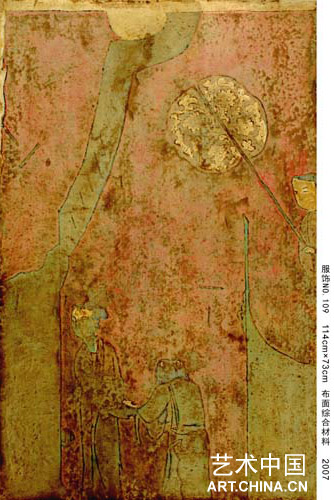
(服飾No.109)114X73cm布面綜合材料2007年
《馮勁草- 08作品展》
參展藝術(shù)家:馮勁草
展覽策劃:時(shí)斌
主辦:夸克藝術(shù)空間
展覽時(shí)間:2008年5月31日- 2008年6月16日
開幕酒會(huì):2008年5月31日 下午3:00
展覽地點(diǎn):夸克藝術(shù)空間(798藝術(shù)區(qū)A05-0-3)
電話:64360837
網(wǎng)址:www.quacart.com
郵箱:quacart@yahoo.com.cn
《Feng Jincao- 08 Solo Exhibition》
Artist: Feng Jincao
Curator: Shi Bin
Organizer : Quac Art Space
Exhibition Date :May 31, 2008 ~ June 16, 2008
Opening Reception : 3pm,5.31
Exhibition Add : Quac Art Space , 798 Art District A05-0-3
Tel : (+8610) 64360837
Website : www.quacart.com
E-mail : quacart@yahoo.com.cn
馮勁草
1989年 畢業(yè)于曲阜師範(fàn)大學(xué)美術(shù)系
1992年 任教于山東省棗莊學(xué)院美術(shù)系
2003年畢業(yè)于中央美術(shù)學(xué)院油畫材料高研班
1997年作品《紅爐》入選山東省首屆油畫作品雙年展,獲學(xué)術(shù)獎(jiǎng);
作品《雞冠花》入選第二屆中國靜物油畫展;
1998年作品《海濱夜色》 《大海印象》參加山東油畫展;
1999年作品《永恒的戀人》參加全國高等師範(fàn)院校美術(shù)教師作品展並獲 “魯藝杯” 二等獎(jiǎng);
2001年作品 《木簡》 入選中國 、西安2001《西部、 西部》 藝術(shù)大展;
2002年作品《痕跡》 被中央美術(shù)學(xué)院收藏;
2003年作品《服飾》入選中國第三屆油畫作品展,獲優(yōu)秀獎(jiǎng)並被中國美術(shù)學(xué)院收藏;
2004年作品《服飾NO.10》入選中國第十屆美展,獲優(yōu)秀獎(jiǎng)並被中國美術(shù)學(xué)院收藏.
2005年作品《城市印象》參加山東省油畫風(fēng)景展並獲學(xué)術(shù)獎(jiǎng);
作品《發(fā)生在盛唐》入選第六屆全國體育美展.
作品《服飾》參加大河上下中國油畫回顧展.
2006年11月在上海“1918藝術(shù)空間”舉辦個(gè)展.
2007年4月在上海“1918藝術(shù)空間”舉辦個(gè)展.
2007年5月在北京“紅子藍(lán)藝術(shù)空間”舉辦個(gè)展.
由江蘇美術(shù)出版社出版發(fā)行《21世紀(jì)優(yōu)秀藝術(shù)家畫集》.
Feng Jincao
1989, graduated from Qufu teacher's university
1992,worked as a art teacher in the Zao Zhuang collage of Shandong
2003, graduated from Central Academy of Fine Arts (CAFA )
1997,work "Red stove" is chosen into Shandong’s oil art biennale Ⅰ
1997,work "Cockscomb" is chosen into Chinese still life oil painting exhibitionⅡ
1998 work “The shades of the seashore” “Impression of the sea”joined in the oil painting exhibition of Shan Dong.
1999 work“forever lover”joined in the works exhibiton of Art teacher.
2001 work “wood simple” chosen into China.Xian2001“West、West”art exhibiton .
2002," Trail l" is collected by CAFA
2003, "Clothes " is chosen into Chinese oil painting work exhibition , gained excellent award and is collected by Chinese art museum;
2004,work "clothes NO.10 " is chosen into the tenth national art exhibition of China, gained excellent award and is collected by Chinese art museum;
2005 work "happen in popular Tang " is chosen into the sixth national sports art exhibition.
2005, "excellent artists of 21st------Feng Jincao’s paintings " be come out by Jiangsu arts press
2005.11, his individual art exhibition be hold in Shanghai
2006,joined in "the present art exhibition of 8 artists " at Quac art space in Beijing.
前言
站在馮勁草的油畫作品面前,我們仿佛正在穿越時(shí)空隧道,耳邊是呼呼的風(fēng)聲,眼前是千層萬疊的煙雲(yún)和不斷模糊變幻的視野,我們逆向時(shí)間軸的速度要追回人類逝去的起點(diǎn),那些凝結(jié)在記憶裏的歷史光芒斑駁地映在我們的衣杉上,我們的文化之根正通過馮勁草特殊的油畫表達(dá)方式,關(guān)懷著當(dāng)代人的精神和生活。在馮勁草的視角,無論人在何方,離自己的母體文化多遠(yuǎn),他身上的文化之根都閃爍可見,而作為畫家,這樣的視角實(shí)在是難能可貴。
對(duì)於馮勁草而言,繪畫就是他的生活。在家鄉(xiāng)不足50平方米的畫室裏除了他多年來在繪畫方面的成果積累以外,已經(jīng)沒有什麼讓他覺得更加珍貴的東西了。他雖然吃住在這間屋子裏,但是從他的淩亂的細(xì)節(jié)可以看出,這些都已經(jīng)無足輕重。
在馮勁草珍藏的作品中,可以清晰地觀察他藝術(shù)發(fā)展的脈絡(luò)。從具像到表現(xiàn),到抽象再到具像,他這種反覆顯示了大多數(shù)畫家求索的過程,他們?cè)趯ふ冶磉_(dá)自我的方式和內(nèi)容上經(jīng)歷的坎坷甚至比生活的磨難更刻骨銘心。什麼才是自己的表達(dá)方式,什麼是自己的追求目標(biāo),都是十分含糊的。而馮勁草則更像一位中國最古樸的農(nóng)夫,在畫布上耕耘著他心中的理想。
在北京東郊的北皋藝術(shù)東區(qū),馮勁草組建了又一個(gè)自己的畫室,在這個(gè)更接近藝術(shù)前沿的地方,他的創(chuàng)作更加灑脫。他把那些構(gòu)想和設(shè)計(jì)預(yù)先勾畫在畫布上,然後用一種獨(dú)特的顏料在上面一層層地塗抹掩蓋,這個(gè)過程就像農(nóng)夫在春天的田野播撒下種子的過程,不同的是----他的設(shè)計(jì)以及對(duì)未來效果的構(gòu)想是十分艱難的。而這樣的塗抹過程往往需要幾十遍。形式和色彩在馮勁草的筆下變換著飄忽不定的影子,它們被畫家組合,然後又分解,再組合,再分解,任憑畫家氾濫的思想洪流擺布。最終,這一切都消失在一片混沌之中,這時(shí)候我們看到的畫面渾然一色。畫家的思想就像埋入地下發(fā)酵的老酒,等待開啟的那一刻才真正是醉人的時(shí)候。
如果説農(nóng)夫的耕耘是辛苦的,那麼馮勁草的耕耘則是痛苦的。他的取捨,他的結(jié)構(gòu)的開闔,色彩的平衡耗費(fèi)的是心血,折磨的卻是思想;如果説農(nóng)夫的收穫是喜悅的,那麼馮勁草的收穫是興奮,甚至於癲狂。他像考古發(fā)掘一養(yǎng),在畫布上尋找。這個(gè)挖掘的過程正是畫家創(chuàng)作過程最驚心動(dòng)魄的時(shí)候,隨著工具與畫布的每一下接觸,跳躍出來的都是意想不到的畫面效果,預(yù)先埋設(shè)下的必然在此時(shí)被發(fā)掘過程中的偶然模糊了,顏料逐漸剝離的過程中,形式和色彩又一次組合起來。
他有意製造的這種偶然是他興奮的源泉,而當(dāng)這股源泉汩汩噴涌的時(shí)候,他會(huì)跳進(jìn)自己的理想世界裏,享受這種表達(dá)的快樂。
馮勁草説:我在畫畫的同時(shí),讓觀眾所了解的並不是我在怎麼做;我畫畫只是想把他們引領(lǐng)到一種“再創(chuàng)作”的境界。為了實(shí)現(xiàn)這樣一種境界,馮勁草的開掘過程必須把握分寸和火候,因此總是背負(fù)著巨大的壓力,畢竟,作為創(chuàng)作的本身,它是艱苦的體現(xiàn):即要讓思想的駿馬奮蹄賓士,又要駕馭自如恰到好處,這恐怕是天下最難的一件事情。
在萬千事物中,馮勁草選擇了服飾作為他的創(chuàng)作載體,並不斷地強(qiáng)化它的符號(hào)功能,作為其畫面構(gòu)成中一個(gè)可近可遠(yuǎn),可出可入的窗口,可以窺見創(chuàng)作者內(nèi)心深處的世界。借助服飾,馮勁草找到了可以信賴的敘述角度,而這個(gè)角度的獲得卻帶有神秘的色彩。
馮勁草在一篇文章中這樣描繪他畫服飾的靈感:求索多年仍未找到自己的道路,幾經(jīng)變化的創(chuàng)作風(fēng)格,讓我疲憊不堪。有一夜在夢中發(fā)覺自己光著身子在大街上游蕩,那種尷尬和羞愧迫使著我四處躲避和尋找,驚醒時(shí)卻發(fā)現(xiàn)窗外的月光映進(jìn)畫室,灑在掛在畫架上的一件襯衫上。這樣的景象一下子刺激了我創(chuàng)作的神經(jīng),服飾系列油畫由此而生。
當(dāng)他冷靜下來揣摩這個(gè)角度的奇妙的時(shí)候,他才感覺到這樣的神來之筆真正基於他二十年繪畫的積累。那些班駁的色彩間閃爍著似曾相識(shí)的影子,那些曾被他幾經(jīng)拋棄的東西,今天變成了寶貴的財(cái)富。
在馮勁草的服飾系列作品中,服飾只是一個(gè)載體,是貫穿人類文明的始終一個(gè)線索。馮勁草借助這條線索,把現(xiàn)代文明和古代文明連接起來,那些代表中國傳統(tǒng)文化的圖案和人物既有它的形式美,又寄寓了馮勁草的文化理想。
馮勁草把他對(duì)中國傳統(tǒng)文化的理解符號(hào)化的過程融進(jìn)了他的憂慮和關(guān)懷。看似具像的畫面語言已經(jīng)失去了它們的本來意義,抽象成一種呼喊,足以震顫心靈。
Commentary of Feng Jincao
Standing in front of these oil paintings of Feng Jincao,as if we were flying through the time tunnel. Whirring wind slipped by, clouds changed their shapes quickly, and continual changing views blurred and danced before our eyes. We trace the jumping-of point of human being in a diverse direction of time's growth. Those brilliant rays of history frozen in memory reflect on our dress, and the root of our culture shows loving care for modern people's sprit and life by Feng’s painting. In his angle of visual, wherever he is or how far he go away from his mother culture, the root of culture gleaming on him are available. As a painter, it's pretty precious to think like that.
For Fengjincao, painting is life. In his studio which is less than fifty square metres..There is nothing but his accumulated achievements in painting make him feel valuable. Though he lives and eats in this room, but from the disorderly details there, we know that these are insignificant.
From his collections, we can clearly see the lines of his art development .From specific to expression, to abstract and then to specific again. This kind of repetition shows many painters' process of exploring. The difficulties in finding their self-expression form and content ever harder than they struggle in life. What is their means of expression, what is the pursuit of their own goals, those answers are very vague. Feng look like an ancient China farmer, working on the canvas in his mind ideals.
In the BeiGao art district in east suburb of Beijing, Feng Jincao build his newart studio. In this art frontier place, his creation becomes more ease . Feng Jincao said: when painting, you don’t know the appearance of the picture but the framework of thought, the blur one. You can paint the probable picture but not the details. And just become of this, every process of painting is a challenge to him that is to which point it is good, from where to begin, to which depth to deplore and what to be shown to the audience. Smetimes there is a long time consideration in the process of performs. The exploration is just the very excited moment of the creative process. The unimaginable planting results burst out as the tools and canvas touches each other. The prepared inevitability is blurred by the accident in the explore process.
If we say farmer’s cultivation is hard, then Feng’s creation is painful. His selection, the fold and open of his structures and the balance of color, all of which expand his effort and harass his thought. If farmer’s gains are delightful, then Feng’s gain is excited even mad. Like the archaeology research, he explores on canvas. The dish cleaners, the spatula and whatever is at his hand can be his proficient tools. As the paint peeling off, the forms and colors combined again.
And this intentional accident is the spring of his excitement. When it springs out ,he will jump into his ideal world and enjoy the happiness of expression .
Feng Jincao said: When i was painting, I’m thinking that I should leave some space to the audience, and let them to think how they will do it but not my way. What I want is to enlighten them to use their own thought to paint through my painting .I just lead them to what they are imagining. Maybe we can consider it as a kind of recreation. To achieve this kind of realm, Feng tries his best to master his skills and sense when he’s painting. Thus he always feels much pressure, after all, to create is to express toughly. Just like an excellent equestrian who wants his horse to run freely and fast while needs him to handle it well too. This can be one of the most difficult things in the world.
Feng chose dress as his art carrier among so many materials, and consolidates its symbolized function step by step, which serves as a window for appreciating his works from both farther and closer, outside and inside. It helps us step into the i how he found it, there is a miracle-colored story.
Feng described his inspiration of dress in one article as follows: Having pursued these many years, there still hasn’t been a style that belongs to me. And such variable patterns made me exhausted. Then, a dream came to me one night in which I was wandering in streets nakedly. That embarrassment and shame forced me to hide and look for here and there until I was forced to wake up. Strangely, I saw the water-like moonlight pouring into my studio, shining on one shirt hanged on a painting shelf. This scene stimulated my creating nerves . Thereafter the series of dress painting were given birth to.
when he calmed down to think over this special angle, he felt this talented creating inspiration was just based on his painting accumulation over the past twenty years. It seems that some familiar shadows are shining among those mottled colors. And what he has abandoned becomes today’s treasure.
In Feng’s series of dress painting, dress is only a carrier, which serves as a clue going through human being’s civilization. Using this clue, Feng combines the modern civilization and ancient civilization. Those designs and figures presenting Chinese traditional culture have their own beautiful forms, and are also implied with the cultural ideal of Feng himself.
Feng blended the understanding of traditional Chinese culture symbol of the process of assimilation into his concern and care. Therefore, the expression of his concrete paintings lose their original meaning, instead, a more abstract appeal touches people’s hearts profoundly.
|

